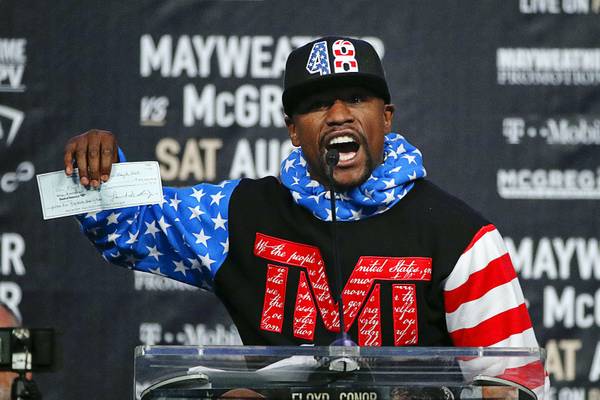WASHINGTON — The IRS still has Floyd Mayweather Jr. on the hook for $7.2 million in taxes from 2010, according to records that show a lien as unresolved for the year he fought Shane Mosley.
That's on top of the $22.2 million the undefeated boxer nicknamed "Money" owes in 2015 taxes for the year he earned $200 million to fight Manny Pacquiao. He brushed off the tax debt in comments to reporters Tuesday at the start of his tour to promote an Aug. 26 boxing match against Irish MMA star Conor McGregor.
Mayweather's public bravado about his wealth doesn't match up with county records in Las Vegas and his own petition to the U.S. Tax Court in Washington.
A petition filed by Mayweather last week argues that as wealthy as he is, he doesn't have the cash on hand to pay his debt for 2015. The IRS refused a direct request by the fighter to pay in installments until he is paid for the McGregor fight, and the agency said it intends to levy Mayweather.
It's the latest in a cycle for Mayweather, who paid $15.5 million in taxes for 2001, 2003-2007 and 2009 only after the IRS filed liens against him, according to documents filed to the Clark County Recorder in Las Vegas.
Mayweather's tax attorney, Jeffrey Morse, said in an email to The Associated Press that the 2010 lien is no longer valid, despite the county court records that show it as unresolved. He did not say when it was resolved or provide any further details.
"There is no tax obligation outstanding for the 2010 tax year," Morse wrote.
Mayweather's business manager, Leonard Ellerbe, declined to answer questions about the tax debt, referring an AP reporter to comments Morse made to a Mayweather-affiliated website.
Morse told Fighthype.com that Mayweather can make more money by paying his taxes late.
"Floyd's a savvy investor and if he is investing money and getting a rate of return that far exceeds what he has to pay the IRS in interest, then any smart business person is going to take advantage of that deferral," Morse said. "So we've taken advantage of that."
The tax court filing, obtained by the AP on Wednesday, said that although Mayweather "has substantial assets, those assets are restricted and primarily illiquid." It says he has a "significant liquidity event" within the next two months — his fight with McGregor, which could earn him a huge purse depending on pay-per-view sales, though likely not the $200 million he got for the Pacquiao fight.
The petition to tax court is an effective stalling tactic because the court moves slowly and would need to send a judge to Nevada to hear the case, said Don Williamson, a professor and chair of the accounting department at American University's Kogod School of Business in Washington.
"They won't rule until after the fight. They don't turn these things around in 30 days," Williamson said.
However, the IRS could still seek to withhold Mayweather's purse from the fight by arguing that he wouldn't pay his taxes otherwise, a claim the agency would have to prove in court, Williamson said.
The IRS sent Nevada boxing regulators a levy notice in 2009, ordering that $5.6 million in unpaid taxes be deducted from Mayweather's $10 million purse as he came out of his first retirement to fight Juan Manuel Marquez. The tax agency backed off only after Mayweather agreed to pay the money.
The Nevada Athletic Commission did not return messages seeking comment on Wednesday.
In the tax court filing, Mayweather claims it would be too much trouble to "disturb" his investments and that the IRS would not be disadvantaged by letting him pay in installments.
McGregor used the tax issue to needle his opponent at a news conference in Los Angeles on Tuesday.
"The reason he has accepted this fight to come out of retirement is because he has to," McGregor said. "He's in a dire situation. That is not a good situation to be in."
Mayweather told reporters he "already took care" of his taxes.
"I ain't worried about that," he said.
Associated Press writers Regina Garcia Cano in Las Vegas and Oskar Garcia in Philadelphia contributed to this report.


Join the Discussion:
Check this out for a full explanation of our conversion to the LiveFyre commenting system and instructions on how to sign up for an account.
Full comments policy